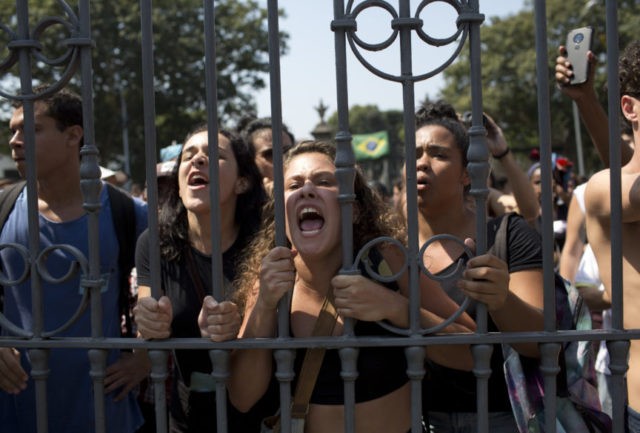The grief in Brazil over the loss of the 200-year-old National Museum in Rio de Janeiro to a fire Sunday night has yielded to outrage, as protesters demand the government better fund protection of national treasures and the administrators in charge of the museum decry negligence in remarks Tuesday.
The museum, home to an estimated 20 million artifacts, went down in flames late Sunday night. Neither the government nor the academic institution responsible for the museum had installed sprinklers or any form of extinguishing system in the building, once the palace of a Portuguese royal family, and firefighters struggled to put the fire out with faulty equipment.
On Tuesday morning, the building awoke still partially on fire, though rain throughout the night helped extinguish some of the remaining embers. Police and firefighters told media on Monday that they believe most of the artifacts in the museum are destroyed, as the second and third floors of the building collapsed into themselves.
The rector of the Federal University of Rio de Janeiro, Roberto Leher, is responsible for maintenance of the museum. In an interview with O Globo published Tuesday, Leher denounced Brasilia’s Ministry of Culture for not investing any funding into historical preservation.
“It is necessary to mobilize the democratic sectors linked to culture,” Leher told the newspaper. “Science, culture, and history have never been part of Brazil’s political project. This fire should challenge Brasilia, especially for society to evaluate where we are going.”
“The Ministry of Culture does not offer resources,” he added. “The museum is a cultural institution, it educates children. But the Ministry of Culture does not have a policy of supporting museums tied to universities. They never gave us a penny.”
With the current fire, that appears to have already begun changing. President Michel Temer announced on Tuesday that the government has begun searching for help from banks and other corporate institutions to fund the reconstruction of the museum. Education Minister Rossieli Soares added that Brazil will also seek aid from UNESCO, a policy that Leher suggested in his interview, as the United Nations historical preservation organization “was fundamental to the recovery of Europe’s museums after World War II.” French President Emmanuel Macron was the first foreign leader to offer financial aid in restoring the museum.
In the meantime, Brasilia has appropriated emergency funding to the National Museum to help recover the little believed to have survived the fire.
The fire had not fully abated by Monday, but police already had to contend with hundreds of protesters, most university students. Police used tear gas and pepper spray to stop some of the protesters from storming the remains of the museum in search of artifacts, as the museum was still partially on fire. After being stopped from entering, the students joined in encircling the museum in a “hug” to express their grief.
Some researchers and workers at the museum also tried to enter the building to salvage what they could find; it remains unclear what they rescued from the debris at the site, if anything.
Brazil’s scientific and historical academic community is also outraged by the negligence that led to the fire, describing the incident in turn as a “tragedy” and “indignation.”
“The destruction of the National Museum is an incalculable disaster and shows that Brazil [itself] is burning in flames. The hydrants didn’t have water, live wires were out in the open, and museum officials had to use a piggy bank to pay expenses,” Lilia Schwarcz, an anthropologist at the University of Sao Paulo, wrote on Facebook after the fire. “Not caring for heritage like this proves how sad and disoriented this country is, with no past and no future.”
Reports from Rio de Janeiro do not indicate that protests are ongoing on Tuesday. The government deployed National Guard troops to the remains of the museum overnight, however, to prevent looting, as firefighters and police have not yet completed their inspection of the site to take full inventory of what survived. As the fire has not completely ended, some parts of the building remain inaccessible.
“The Army Guards Battalion, headquartered in São Cristóvão, has had its security perimeter provisionally extended to cover the whole site of the fire, thus reinforcing the area’s security, in coordination with the PM and with the Municipal Guard,” the military’s Eastern Command said in a statement to the magazine Veja.
Rio de Janeiro has long been plagued by government funding shortfalls that have forced police to ask locals to donate toilet paper and made Brasilia dispatch the military to control the fire department. These funding lapses were made significantly worse by the millions the socialist governments of former presidents Lula da Silva, currently in prison, and Dilma Rousseff, removed by impeachment, spent on hosting the Summer Olympics and FIFA World Cup within two years of each other.

COMMENTS
Please let us know if you're having issues with commenting.